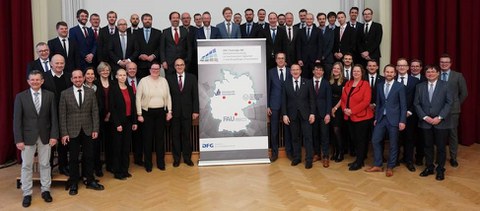May 23, 2023
Collaborative Research Center to optimize production processes will be extended
The interdisciplinary CRC of TU Dresden (TUD), University of Paderborn and Friedrich Alexander University Erlangen-Nuremberg will receive DFG funding for another four years.
The German Research Foundation (DFG) has extended the funding of the Collaborative Research Center “Method development for the mechanical joinability in adaptable processes”. The CRC/Transregio 285 will receive approx. 11 million euros for the second four-year funding period. Since 2019, researchers from TU Dresden, the University of Paderborn and Friedrich Alexander University Erlangen-Nuremberg have been collaborating in the interdisciplinary CRC in the field of production engineering. Their objective is to develop flexible joining technologies that replace the current rigid processes and enable an adaptable process chain. In this way, state-of-the-art production processes are to be adjusted according to the increasing variety of products due to different materials and construction methods.
Flexible joining and adaptable process chains
Be it in automotive construction, medical or household appliance technology: In all areas of product manufacturing, constructions are assembled from individual components to form more or less complex structures with numerous joints. However, the growing variety of products, ever shorter model cycles and ecological restraints pose significant challenges for the joinability in production processes.
Prof. Dr.-Ing. Gerson Meschut, speaker of the CRC and head of the Laboratory for Material and Joining Technology (LWF) at the University of Paderborn, states: "Due to the ever increasing desire for lightweight yet stable structures of products, the demands on joining technology are also growing. In the CRC, we are therefore examining the entire process chain from materials to design and production."
"We are overjoyed to be given the opportunity to conduct intensive research into methods and joining technologies for production engineering for another four years. It is our objective to be able to utilize them to flexibly design mechanical joining processes and to swiftly and effectively accommodate new requirements. This saves both material and energy, since every metal sheet produced first needs a large amount of resources to be manufactured," explains Prof. Alexander Brosius, Chair of Forming Processes and TUD’s speaker in this consortia project. He adds: "If, by using adaptable joining technology, we can avoid scrap in the future, we're on the right path towards an even more sustainable manufacturing technology."
So far, mechanical joining processes have been inflexibly configured for the desired products. This limits both the flexibility of design when selecting materials and the design possibilities of the manufactured product. When it comes to adjustments in production – for example, changing the sheet thickness of a car body – all adjustments must first be verified experimentally. The researchers have endeavored to change this. They explore how targeted changes in product design can be made in adaptable process chains in a resource-efficient way. This should enable manufacturers to implement tailored revisions in the individual process steps.
Contact:
Prof. Dr.-Ing. Alexander Brosius
Chair of Forming Processes
Institute of Manufacturing Science and Engineering
Faculty of Mechanical Science and Engineering
TU Dresden
Tel.: +49 351 463 33371
Email: alexander.brosius@tu-dresden.de

